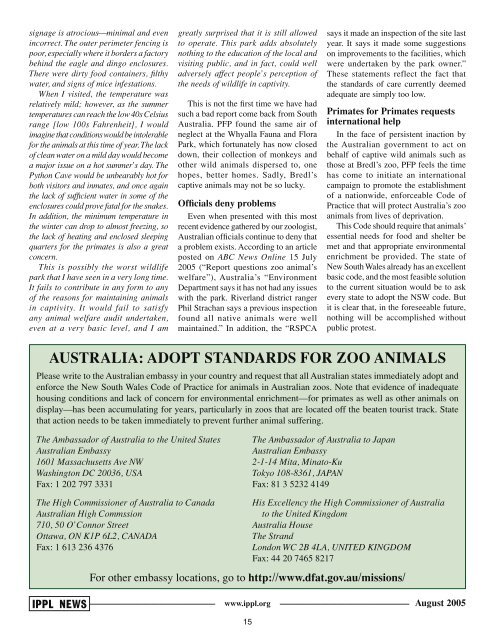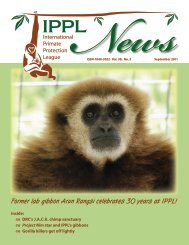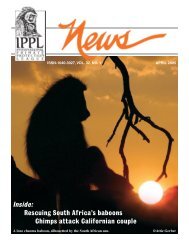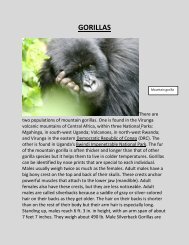IPPL News Aug05.indd - International Primate Protection League
IPPL News Aug05.indd - International Primate Protection League
IPPL News Aug05.indd - International Primate Protection League
You also want an ePaper? Increase the reach of your titles
YUMPU automatically turns print PDFs into web optimized ePapers that Google loves.
signage is atrocious—minimal and even<br />
incorrect. The outer perimeter fencing is<br />
poor, especially where it borders a factory<br />
behind the eagle and dingo enclosures.<br />
There were dirty food containers, filthy<br />
water, and signs of mice infestations.<br />
When I visited, the temperature was<br />
relatively mild; however, as the summer<br />
temperatures can reach the low 40s Celsius<br />
range [low 100s Fahrenheit], I would<br />
imagine that conditions would be intolerable<br />
for the animals at this time of year. The lack<br />
of clean water on a mild day would become<br />
a major issue on a hot summer’s day. The<br />
Python Cave would be unbearably hot for<br />
both visitors and inmates, and once again<br />
the lack of sufficient water in some of the<br />
enclosures could prove fatal for the snakes.<br />
In addition, the minimum temperature in<br />
the winter can drop to almost freezing, so<br />
the lack of heating and enclosed sleeping<br />
quarters for the primates is also a great<br />
concern.<br />
This is possibly the worst wildlife<br />
park that I have seen in a very long time.<br />
It fails to contribute in any form to any<br />
of the reasons for maintaining animals<br />
in captivity. It would fail to satisfy<br />
any animal welfare audit undertaken,<br />
even at a very basic level, and I am<br />
greatly surprised that it is still allowed<br />
to operate. This park adds absolutely<br />
nothing to the education of the local and<br />
visiting public, and in fact, could well<br />
adversely affect people’s perception of<br />
the needs of wildlife in captivity.<br />
This is not the first time we have had<br />
such a bad report come back from South<br />
Australia. PFP found the same air of<br />
neglect at the Whyalla Fauna and Flora<br />
Park, which fortunately has now closed<br />
down, their collection of monkeys and<br />
other wild animals dispersed to, one<br />
hopes, better homes. Sadly, Bredl’s<br />
captive animals may not be so lucky.<br />
Officials deny problems<br />
Even when presented with this most<br />
recent evidence gathered by our zoologist,<br />
Australian officials continue to deny that<br />
a problem exists. According to an article<br />
posted on ABC <strong>News</strong> Online 15 July<br />
2005 (“Report questions zoo animal’s<br />
welfare”), Australia’s “Environment<br />
Department says it has not had any issues<br />
with the park. Riverland district ranger<br />
Phil Strachan says a previous inspection<br />
found all native animals were well<br />
maintained.” In addition, the “RSPCA<br />
says it made an inspection of the site last<br />
year. It says it made some suggestions<br />
on improvements to the facilities, which<br />
were undertaken by the park owner.”<br />
These statements reflect the fact that<br />
the standards of care currently deemed<br />
adequate are simply too low.<br />
<strong>Primate</strong>s for <strong>Primate</strong>s requests<br />
international help<br />
In the face of persistent inaction by<br />
the Australian government to act on<br />
behalf of captive wild animals such as<br />
those at Bredl’s zoo, PFP feels the time<br />
has come to initiate an international<br />
campaign to promote the establishment<br />
of a nationwide, enforceable Code of<br />
Practice that will protect Australia’s zoo<br />
animals from lives of deprivation.<br />
This Code should require that animals’<br />
essential needs for food and shelter be<br />
met and that appropriate environmental<br />
enrichment be provided. The state of<br />
New South Wales already has an excellent<br />
basic code, and the most feasible solution<br />
to the current situation would be to ask<br />
every state to adopt the NSW code. But<br />
it is clear that, in the foreseeable future,<br />
nothing will be accomplished without<br />
public protest.<br />
AUSTRALIA: ADOPT STANDARDS FOR ZOO ANIMALS<br />
Please write to the Australian embassy in your country and request that all Australian states immediately adopt and<br />
enforce the New South Wales Code of Practice for animals in Australian zoos. Note that evidence of inadequate<br />
housing conditions and lack of concern for environmental enrichment—for primates as well as other animals on<br />
display—has been accumulating for years, particularly in zoos that are located off the beaten tourist track. State<br />
that action needs to be taken immediately to prevent further animal suffering.<br />
The Ambassador of Australia to the United States<br />
Australian Embassy<br />
1601 Massachusetts Ave NW<br />
Washington DC 20036, USA<br />
Fax: 1 202 797 3331<br />
The Ambassador of Australia to Japan<br />
Australian Embassy<br />
2-1-14 Mita, Minato-Ku<br />
Tokyo 108-8361, JAPAN<br />
Fax: 81 3 5232 4149<br />
The High Commissioner of Australia to Canada<br />
Australian High Commssion<br />
710, 50 O’Connor Street<br />
Ottawa, ON K1P 6L2, CANADA<br />
Fax: 1 613 236 4376<br />
——————————————————————— <strong>IPPL</strong> NEWS<br />
www.ippl.org ———————————————— August 2005<br />
15<br />
His Excellency the High Commissioner of Australia<br />
to the United Kingdom<br />
Australia House<br />
The Strand<br />
London WC 2B 4LA, UNITED KINGDOM<br />
Fax: 44 20 7465 8217<br />
For other embassy locations, go to http://www.dfat.gov.au/missions/










